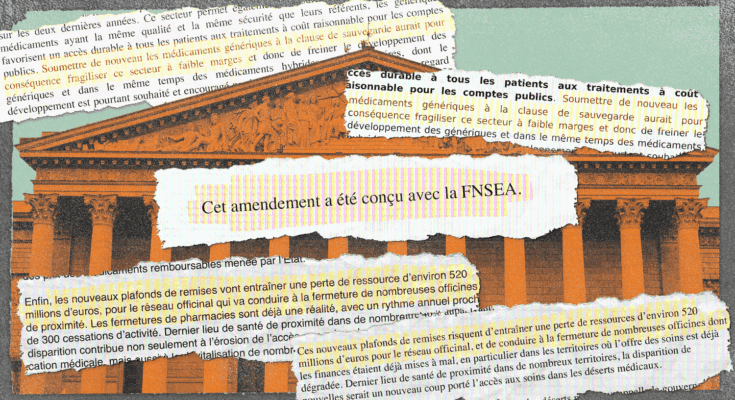Franceinfo, in collaboration with L’Œil du 20 Heures, has identified more than twenty external actors behind at least 300 amendments. A legal practice, but sometimes less transparent.
Among the more than 3,400 amendments proposed to the Social Security Financing Bill (PLFSS), there were at least 300 amendments that were not written by the deputies, nor by their collaborators. While the PLFSS must be voted on in the hemicycle on Wednesday 12 November, franceinfo and France 2’s “L’Œil du 20 Heures” analyze all the texts submitted by elected officials. The result: hundreds of similar amendments submitted multiple times, from deputies of all political stripes.
These are ready-made amendments, sent to lawmakers by companies, associations or unions. Franceinfo and “L’Œil du 20 Heures” have access to some of them. Already laid out, the texts are designed to be copied and pasted by elected officials to submit as amendments. A legal practice, however, raises questions about transparency, when the original editor, assimilated to the “representative of interests” according to the law, is not mentioned. In its latest annual report, Assembly ethics officials invited deputies to do just that “show clearly the source” the resulting amendments “exchange with representatives of interests”, in a “concern for transparency”. And this, even though nothing requires them to do so.
Currently, the Sapin II law stipulates that “private legal entities, public institutions or public groups carrying out industrial and commercial activities” are representatives of interests. In contrast, unions are not considered as such. According to Olivier Costa, CNRS research director at Cevipof (Sciences Po Paris), MPs are free to send any text they want, whatever its origin: “There are no regulations regarding this. The right to make amendments is the absolute right of deputies who do not have to be responsible. Legally, this is not a problem.”
This is why, amidst the debate over the PLFSS, certain amendments appear to have unanimous support. One of them, regarding the return of commercial discounts for generic drugs in pharmacies, was proposed 24 times by four groups: communists, socialists, macronists and right-wingers. If these 24 texts are very similar, it is because they were written by the French Federation of Pharmaceutical Unions (FSPF). According to documents obtained by franceinfo, the amendments have been sent to deputies from all parties. In the hope that it will be taken back.
/2025/11/11/nouveau-projet-69131b89e7bd2970977262.jpg)
Guillaume Garot, a socialist deputy (Mayenne), was one of the elected officials who submitted an amendment on October 31 proposing “set a minimum limit (40%) of commercial discounts (drugs) general”. Asked by franceinfo, he assured “ has been sensitive to pharmacists’ arguments for maintaining pharmacies throughout our region and particularly where we are experiencing medical desertification“. If FSPF is not mentioned in the text, its deputy admit negligence. He envisions a technological solution to compensate for this shortcoming: “We need to give lawmakers the tools to fully comply with ethics rules. Maybe we need to move forward by equipping ourselves with new ways, and I’m thinking about artificial intelligence, so that we know where an amendment is coming from every time it’s tabled.”
FSPF spokesman Yorick Berger was responsible for sending a text to elected officials ready to be used to reverse the Bayrou government’s decision to eliminate commercial discounts for generic drugs. “One MP can’t know everything. We know the ins and outs of the pharmacist situation. So, we put it in black and white, and it’s up to the MP to make the decision.” The amendment was adopted in a public session, and although there is no text stating its origin, the pharmacist said “a bit proud” from this joint work.
Representatives of other interests were more cautious. Among the more than 3,400 proposed amendments to the 2026 PLFSS, approximately twenty texts relate specifically to generic drugs. Delivered exclusively by groups ranging from Liot (Liotés, independents, abroad and regions) to the Republican Right via the Ensemble pour la République and Horizons, the documents were actually written by two pharmaceutical laboratories. According to documents consulted by franceinfo, it is Biogaran and Upsa that did not respond to our requests.
In the document Biogaran sent to elected officials there are seven turnkey amendments. Number six begins with a warning: “Introduced through Law Number 98‑1194 of 23 December 1998 concerning Social Security Financing in 1999, the safeguard clause aims to ensure better compliance with the national health insurance (Ondam) spending objectives.” Three texts submitted by right-wing Republican lawmakers, another from the Ensemble pour la République (EPR), as well as MP Liot, begin word for word in the same way. Typos in the text written by Biogaran were even found in three of the amendments. In a sentence: “Rejecting generic medicines from the safeguard clause will have the effect of weakening this low-margin sector…” The preposition “de” is lost between “consequence” and “weaken”. The lack of agreement is also apparent at the end of the quote. No MPs corrected this error and the amendment was adopted. Finally, only the EPR MP stated: “Amendments carried out with Biogaran”.
Asked about this lack of transparency, MP Liot’s team member Stéphane Viry also admitted he had forgotten. He assured that “This is not a copy and paste just to please Biogaran. We proposed this amendment because this is long-term work we are doing with them. Lawmakers embraced this idea and supported this provision.” For these parliamentary collaborators, texts written by third parties were an important help: “When changes are needed The Finance Bill and PLFSS are on very tight deadlines, as the government is late in providing SMS to us, sometimes complicated. So amendments that are more turnkey, that guide us on what we want to do, allow us to save time.”
These observations were qualified by collaborator France Insoumise. “In the rebel group, as soon as the budget text arrives, we distribute missions by committee. There are always two deputies to mediate and distribute amendments. There are those who submit their own texts or proposals that they get from the associative world or intermediary bodies. We also have a group team that is well trained in their field and will give their opinion on the amendments. Then, we mediate and put them on the table.” The collaborator assumes responsibility for proposing amendments from the association, even if he or she is “It’s rare that we take back what was sent to us.”
One question remains: how to increase the transparency of the relationship between parliamentarians and representatives of these interests? One solution is to collect all amendments drafted by these parties outside the Assembly. This is what was proposed by the non-governmental organization to eradicate corruption, Transparency International France. In an article from Western FranceKevin Gernier, head of advocacy at the NGO, supports the creation of a platform where MPs would take up important amendments they care about: “It will be transparent, we know who deposited what.” However, implementing these regulations will not be easy, according to Olivier Costa: “We have difficulty regulating lobbying in France, because we live with the idea that lobbying is bad. That lobbying should not exist. And attempts to regulate it, in some ways, acknowledge its existence.”



